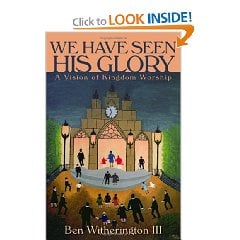My latest book, which comes out on Feb. 15th, and can be ordered now at Amazon deals with the issue of the sorry state of worship in the Protestant Church these days, with much of what passes for worship being little more than Christian entertainment or stand up spotlight monologues or anthropocentric ‘felt-needs’ based preaching. In this new book I am attempting to call us towards a more theologically rich and Biblically centered practice of worship. Below you will find a sample of it from the Forward to the book.
—————
One of the things that has
preoccupied my mind in recent years is the issue of worship. I have been surprised to discover how very
little time NT scholars spend talking about it, or even about the texts in the
Bible that describe worship. I have
looked in vain for good textbooks written by Biblical scholars on what the
Bible, or even just the NT, says about worship.[1] As Shakespeare would say, this is ‘passing
strange’, especially since worship is something most of us are involved in
every single week. Perhaps one reason
for this surprising silence comes to light when I report a recent discussion I
had with a NT colleague.
I asked him where
he was going to church these days. He
beat around the bush for a while, and then confessed that he had not yet come
upon a church that he and his wife really found ‘ministered to them’ and got
them excited about worshipping God, so they went to church sporadically and
tried different churches, never committing to one in particular. These were
revealing comments, and what they revealed is that my friend had gotten caught
up in the consumer approach to worship, the attitude that one goes to a church
because it ‘ministers to me’. Not, mind
you, ‘I go to a church because that’s where I can best serve’ but rather ‘I go
to a church where I am best served’. This
sort of anthropocentric or consumer oriented approach to worship is all too
common in our narcissistic culture, and it got me thinking about what the NT
actually says about worship, especially about the ultimate and final vision of
worship, both heavenly and
eschatological worship as depicted, for example, in the book of Revelation. Alas, worship as we experience it is
imperfect, always caught betwixt and between, but perhaps a clearer vision of
what worship can be will give us some guidance for better praxis of the art of
worshipping.
My
thoughts on this subject have developed over time both while I have been an
academic for the last 30 years and also with the pasturing of six churches
along the way. Some urgency came into my thinking when I realized how little
theological reflection goes into the planning of a worship service these days. Whether the service is some form of
‘traditional’ worship or a modern ‘praise’ service, whether it is highly liturgical or just a
‘hymn sandwich’, worship as we practice it seems to dwell entirely too much on
the past, and too little on the finish line–Kingdom Come. Suppose, however, we were to ‘pay it forward’
rather than replaying it backwards?
Suppose we envisioned Christian worship in light of the eschaton rather
than in light of what has already gone before in the past, in light of Kingdom
come rather than in light of kingdoms gone?
And trust me, in America
there are some ecclesiastical kingdoms which have come and gone, even though
some Christians are fervently praying that next year will be 1954. In this
little study I hope to explore the possibilities of a Kingdom come sort of
worship. What would that look like, and
could we get excited about it and actually do it? Isn’t it about time, here at the cusp of the
21rst century that we thought seriously and theologically about these matters?
I
am convinced that one of the great problems to having a more reflective and
more Christian approach to worship is that even many of our ministers and worship
leaders have very little understanding of what the NT actually says about
worship, what it is meant to be, what it entails, and what we ought to do. In this study I hope to remedy some of that
problem and tease some minds into active thought about what worship should look
like if we really believe that God’s kingdom is coming. In so doing I hope to make clear that worship
should involve “an assurance of things hoped for, and a conviction about things
not yet seen” (Heb. 11.1), and so should be an act of forward looking faith,
hope, and love. Hopefully, these opening remarks have peaked
your curiosity. Its time for us to
explore a more Biblical and Kingdom-oriented vision of worship.[2]
[1] For
example, hardly a passing reference is made to a theology of worship in the
otherwise useful recent study Theological Interpretation of the New
Testament, K.J. Vanhoozer Gen. Ed (Grand Rapids: Baker, 2005) and even F. Matera’s full dress and very helpful study
New Testament Theology, (Lousiville: Westminster/J. Knox, 2007) give scant attention to the subject. The OT was covered long ago by H.H. Rowley,
but his study is very dated at this juncture.
[2] Since I
have written three volumes on the sacraments (one on baptism, one on the Lord’s
Supper, one on the Word of God as sacramental) I do not intend to focus on
those aspects of worship in this particular study, not because I do not think
they are an important part of worship— I absolutely do. Rather, I want to
focus here more broadly on a proper theological understanding and orientation
to what Christian worship actually is and does. Those books are Troubled Waters, Making a
Meal of It, and The Living Word
of God, all published by Baylor U. Press in 2006 and 2007.


